Do you want to learn Adverbs and Their Types? well, Adverbs are a fundamental component of language, serving as modifiers for verbs, adjectives, clauses, and even other adverbs. If you’ve studied grammar, you are undoubtedly aware that adverbs include phrases like everywhere, quickly, and softly. However, did you know that adverbs come in a variety of forms? It’s true, and by learning more about six typical adverb forms that we frequently utilize, we’ll discover just how adaptable adverbs can be.
what is an Adverb?
A word that alters a verb, adjective, phrase, or other adverb is called an adverb. Adverbs alter another word in a phrase to add more information. In the sentence “Jeremiah ran quickly,” for instance, the adverb “quickly” indicates that Jeremiah ran swiftly. As an additional illustration, the adverb in the phrase actually The fact that the movie was quite dull indicates that it was an enormous snooze-fest rather than just being dull.
Also Read:
Adjectives and Their Types
Verbs and Their Types
Pronouns and their Types
Types of Nouns with Examples
8 Parts of Speech
Types of Adverbs in English Grammar:
- Adverbs of manner
- Adverbs of place
- Adverbs of time
- Adverbs of frequency
- Adverbs of degree
- Adverbs of certainty
- Adverbs of negation
- Adverbs of affirmation
- Adverbs of comparison
- Adverbs of duration
- Adverbs of frequency and repetition
- Adverbs of sequence
12 Adverbs and Their Types, Definitions, and Examples:
Adverbs of Manner
- Definition: Adverbs of manner describe how an action is performed.
- Adverbs: quickly, slowly, happily, carefully, loudly
- Examples:
- She danced happily at the party.
- The cat walked slowly across the room.
- He completed the puzzle carefully.
Adverbs of Place
- Definition: Adverbs of place indicate where the action is happening.
- Adverbs: here, there, everywhere, inside, outside
- Examples:
- The keys are lying there on the table.
- They went inside the house to escape the rain.
- Birds were flying everywhere in the sky.
Adverbs of Time
- Definition: Adverbs of time specify when an action takes place.
- Adverbs: now, then, soon, later, yesterday
- Examples:
- We should start our homework now.
- He will arrive soon at the airport.
- She visited her grandmother yesterday.
Adverbs of Frequency
- Definition: Adverbs of frequency indicate how often something happens.
- Adverbs: always, often, sometimes, rarely, never
- Examples:
- He brushes his teeth always before bed.
- They go to the movies rarely.
- She eats seafood never.
Adverbs of Degree
- Definition: Adverbs of degree modify the intensity or degree of an action.
- Adverbs: very, extremely, quite, too, enough
- Examples:
- She was very tired after the long journey.
- The movie was extremely boring.
- He is quite tall for his age.
Adverbs of Certainty
- Definition: Adverbs of certainty express how sure or confident someone is about something.
- Adverbs: definitely, certainly, surely, probably, maybe
- Examples:
- She will definitely attend the meeting.
- He is probably going to be late.
- They will surely win the game.
Adverbs of Negation
- Definition: Adverbs of negation indicate the absence or denial of an action.
- Adverbs: not, never, no, hardly, scarcely
- Examples:
- He is not interested in watching the movie.
- She never eats fast food.
- There is no milk left in the fridge.
Adverbs of Affirmation
- Definition: Adverbs of affirmation confirm or agree with a statement.
- Adverbs: yes, certainly, indeed, absolutely, surely
- Examples:
- Yes, I will help you with your homework.
- He will certainly attend the party.
- She is indeed a talented musician.
Adverbs of Comparison
- Definition: Adverbs of comparison compare the degree or intensity of actions or qualities.
- Adverbs: more, less, most, least, equally
- Examples:
- She sings more beautifully than her sister.
- He runs less quickly than his brother.
- This book is equally interesting as the one you read before.
Adverbs of Duration
- Definition: Adverbs of duration indicate how long an action lasts.
- Adverbs: briefly, temporarily, permanently, momentarily, constantly
- Examples:
- He paused briefly before answering the question.
- The exhibit will be open temporarily for two weeks.
- They lived in the city permanently after retirement.
Adverbs of Conjunction:
- Definition: Adverbs of conjunction are words that connect and show the relationship between two clauses or sentences.
- Adverbs: However, Nevertheless, Meanwhile, Therefore, Thus, Moreover, Furthermore, Nonetheless, Consequently, Hence, Additionally, Likewise, Accordingly, Similarly, Nonetheless, In contrast,
- Examples:
- However, she completed the project on time.
- Meanwhile, they were working on another task.
- Therefore, we decided to go out.
Adverbs of Sequence
- Definition: Adverbs of sequence indicate the order of events.
- Adverbs: firstly, secondly, finally, then, next
- Examples:
- Firstly, we need to gather all the materials.
- She prepared the salad next.
- Finally, we served the main course.
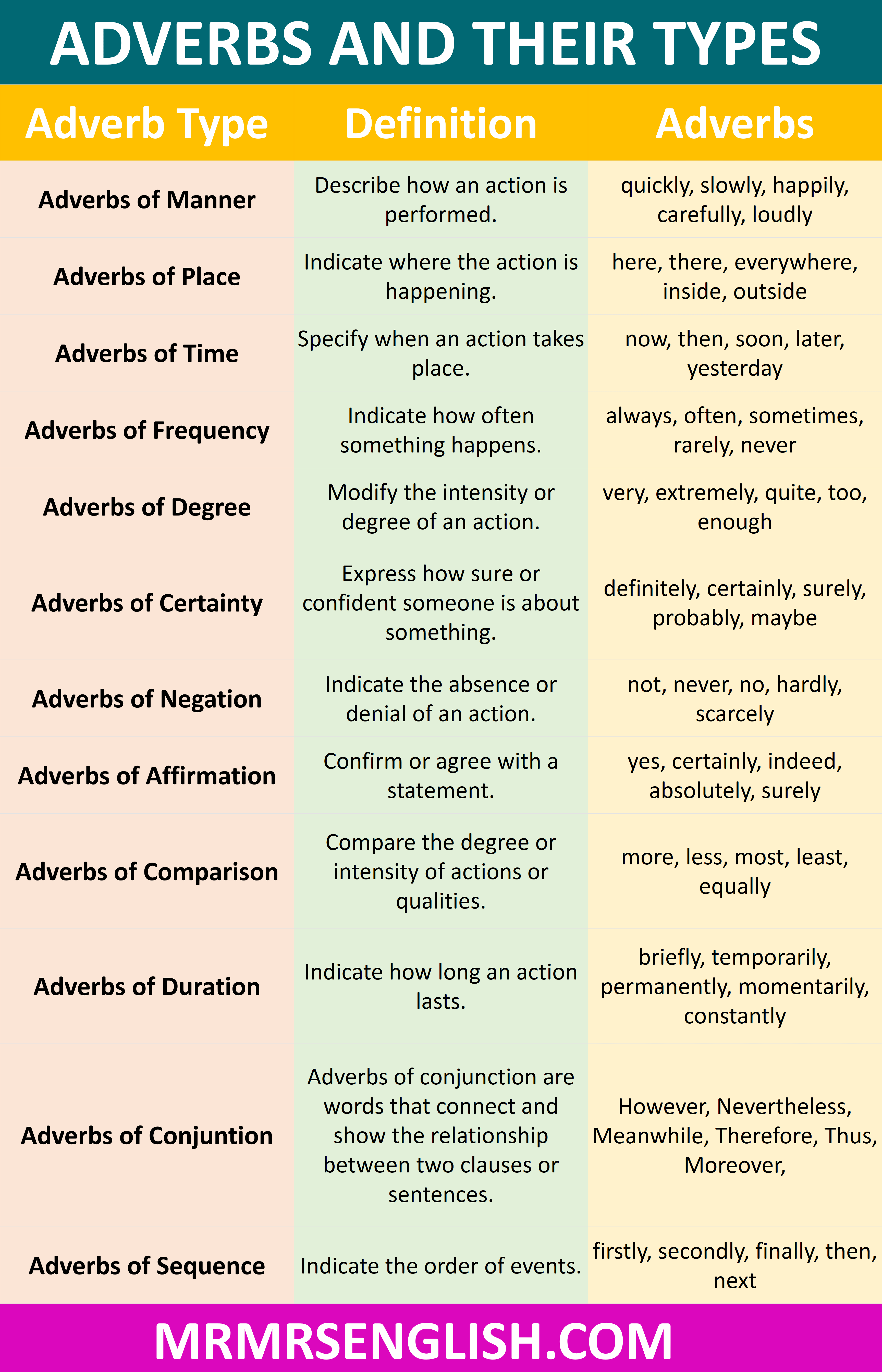

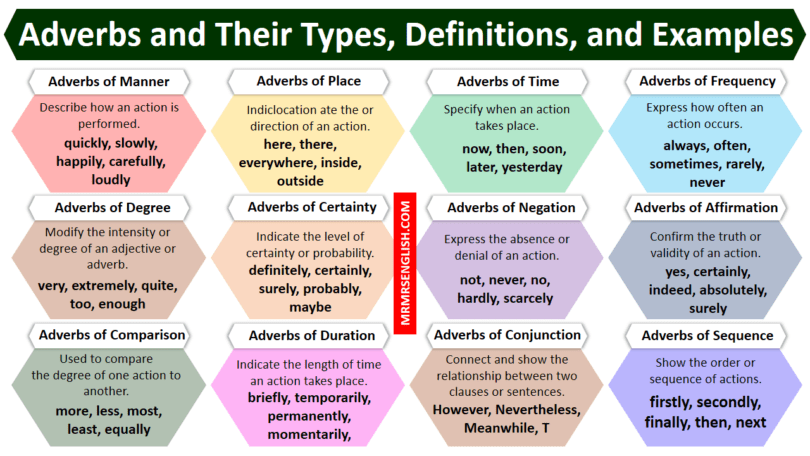


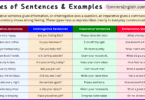
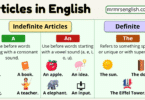
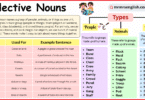
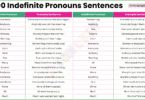
Leave a Comment